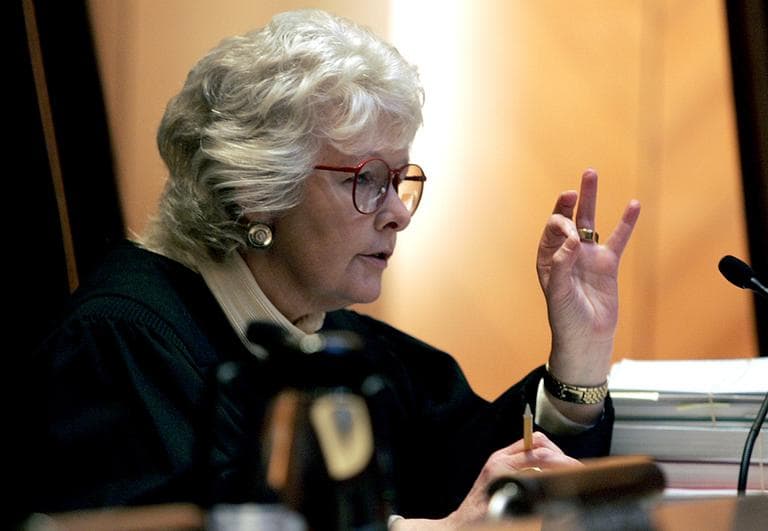Advertisement
Gay Marriage Legal Opinion A Hit At Weddings

As the Supreme Court takes up the issue of gay marriage next week, we thought we'd take a quick look at an unexpected effect of the 2003 Massachusetts decision to allow same-sex marriage.
Margaret Marshall, Chief Justice of the Massachusetts Supreme Judicial Court from 1999 to 2010, wrote the majority opinion in the 2003 "Goodridge v. Department of Public Health" case that was the first in the country.
Her eloquent words not only made history, but in recent years they've also proved to be a popular reading choice at weddings, not only for gay couples but heterosexual couples as well.
Marshall, now retired, told Here & Now, "I don't think too many judges think when they write opinions that it's going to be poetry, but from time to time I'm sent a program from a wedding, and it's always touching when I see Shakespeare, John Donne, Margaret Marshall ... very good company."
Excerpts of the majority opinion by Chief Justice Marshall:
(Click here to read the whole decision)Civil marriage is at once a deeply personal commitment to another human being and a highly public celebration of the ideals of mutuality, companionship, intimacy, fidelity, and family. "It is an association that promotes a way of life, not causes; a harmony in living, not political faiths; a bilateral loyalty, not commercial or social projects." Because it fulfills yearnings for security, safe haven, and connection that express our common humanity, civil marriage is an esteemed institution, and the decision whether and whom to marry is among life's momentous acts of self-definition.
It is undoubtedly for these concrete reasons, as well as for its intimately personal significance, that civil marriage has long been termed a "civil right."
Without the right to marry - or more properly, the right to choose to marry - one is excluded from the full range of human experience and denied full protection of the laws for one's "avowed commitment to an intimate and lasting human relationship." Because civil marriage is central to the lives of individuals and the welfare of the community, our laws assiduously protect the individual's right to marry against undue government incursion.
That same-sex couples are willing to embrace marriage's solemn obligations of exclusivity, mutual support, and commitment to one another is a testament to the enduring place of marriage in our laws and in the human spirit.
In separate news on Monday, Hillary Clinton has thrown her support behind gay marriage, in a video posted by the Human Rights Campaign:
Guest:
- Margaret Marshall, Chief Justice of the Massachusetts Supreme Judicial Court from 1999 to 2010.
This segment aired on March 18, 2013.
